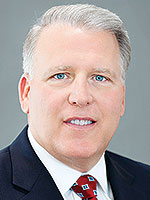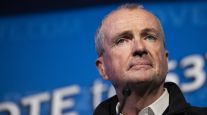Opinion: ATA’s Strength Built on Solidarity
A year ago, I accepted one of the great honors of my professional life — being elected the 73rd chairman of American Trucking Associations. It seems like just yesterday we were gathered in Orlando at last year’s MCE to celebrate trucking and to bring our industry together in pursuit of common goals.
In my year as chairman, I have traveled the country — spoken to dozens of state associations, the backbone of our federation — met with countless drivers, executives and lawmakers, represented our industry at events on Capitol Hill and visited the White House. And over that time, my belief has been reaffirmed that our industry and our association is as united and strong as ever.

Manning
That strength and unity is translating into impressive results for trucking.
By coming together with one voice, ATA has been able to effectively advocate on issues that motor carriers deem important. Through the hard work of President Chris Spear and the entire ATA team, Washington is taking notice of trucking’s need to identify, attract and train the next generation of drivers.
A key element of that effort is the DRIVE-Safe Act, legislation introduced in the House and Senate that would — with enhanced training and technology safeguards — afford younger Americans the opportunity to pursue a career in trucking. Right now, 48 states allow drivers younger than 21 to obtain a commercial driver license and drive a commercial vehicle on intrastate routes, but federal law prevents them from crossing state lines and fully participating in our interstate industry.
This makes no sense, setting up a situation where a driver could haul a load 250 miles from Kansas City, Mo., to St. Louis — but not the 2½ miles from Kansas City, Mo., to Kansas City, Kan.
Moving those goods safely and efficiently is something our industry takes seriously. It’s why trucking collectively spends nearly $10 billion on safety technology and training each year. It’s why we successfully urged Congress and the Department of Transportation to move forward with life-saving electronic logging device requirements and now are pressing for smart reforms to the hours-of-service rules. It’s why we’re seeking a national standard — not a patchwork of 50 separate and differing state standards — for hours of service and meal and rest breaks.
Having one unified voice on these issues is paramount, and the fact that these issues are at the forefront of the agenda in Washington is a testament to how ATA has been able to speak with a single, strong voice and a cohesive message.
As we head into an uncertain political future — with midterm elections just a few weeks away and the preparations for the 2020 presidential campaign already ramping up — having a unified voice will be vital to achieving success.
Next year, we expect infrastructure investment to once again be on the congressional agenda, and ATA will be advocating not just for more funding, but for intelligent, efficient funding mechanisms like its proposal for the Build America Fund.
As truckers, we have a unique perspective on how to maintain our roads and bridges — and the critical need to modernize our highways. We also have a definitive perspective on how the lack of federal investment is forcing states to make the poor decision to embrace tolling.
In the past year, we took Rhode Island to court for a trucks-only tolling program that discriminates against this industry. ATA will continue to fight the program, because if it doesn’t, more states could follow this bad example. We’ve already seen Indiana announce inequitable truck-only tolls — compounding its catastrophic decision to sell the Indiana Toll Road to foreign investors. Each new state-level toll scheme is yet another incentive to continue pushing our leaders in Washington to do their job and properly fund our infrastructure.
In looking back at my term as chairman, I’m most struck by the passionate and hard-working folks in our industry, many of whom I have gotten to know personally. From executives to our truck driving champions, I have witnessed individuals who work hard every day, who are proud of the work that they do and who are willing to be warriors for our industry. Being in the presence of these trucking heroes has been a blessing and an experience I will never forget. It also has convinced me our industry is strong and will never let regulators or legislators forget that trucking is the engine that moves our nation’s economy.
The honor of representing this industry came as a result of getting involved in ATA. I want to encourage my fellow members to stay involved. The more we work together and the more we speak together with one voice, the more effective ATA can be in solving the problems our industry faces.
Our strength comes in our solidarity, in our willingness to agree to disagree on some issues and work together to support each other and our great staff on the key issues facing our industry. I’d like to thank you all for your support for me and my family this past year, and I know you’ll be in good hands with my friend Barry Pottle as he takes the reins at ATA.
Dave Manning also is president of TCW, based in Nashville, Tenn. American Trucking Associations is the largest trade federation in the trucking industry and has headquarters in Arlington, Va., and affiliated associations in every state. ATA owns Transport Topics.




